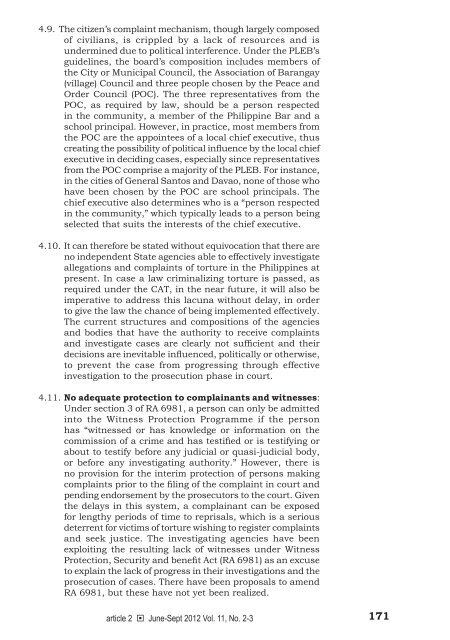Create successful ePaper yourself
Turn your PDF publications into a flip-book with our unique Google optimized e-Paper software.
4.9. The citizen’s complaint mechanism, though largely composed<br />
of civilians, is crippled by a lack of resources and is<br />
undermined due to political interference. under the PLEB’s<br />
guidelines, the board’s composition includes members of<br />
the City or municipal Council, the Association of Barangay<br />
(village) Council and three people chosen by the Peace and<br />
Order Council (POC). The three representatives from the<br />
POC, as required by law, should be a person respected<br />
in the community, a member of the Philippine Bar and a<br />
school principal. however, in practice, most members from<br />
the POC are the appointees of a local chief executive, thus<br />
creating the possibility of political influence by the local chief<br />
executive in deciding cases, especially since representatives<br />
from the POC comprise a majority of the PLEB. For instance,<br />
in the cities of general Santos and Davao, none of those who<br />
have been chosen by the POC are school principals. The<br />
chief executive also determines who is a “person respected<br />
in the community,” which typically leads to a person being<br />
selected that suits the interests of the chief executive.<br />
4.10. It can therefore be stated without equivocation that there are<br />
no independent State agencies able to effectively investigate<br />
allegations and complaints of torture in the Philippines at<br />
present. In case a law criminalizing torture is passed, as<br />
required under the CAT, in the near future, it will also be<br />
imperative to address this lacuna without delay, in order<br />
to give the law the chance of being implemented effectively.<br />
The current structures and compositions of the agencies<br />
and bodies that have the authority to receive complaints<br />
and investigate cases are clearly not sufficient and their<br />
decisions are inevitable influenced, politically or otherwise,<br />
to prevent the case from progressing through effective<br />
investigation to the prosecution phase in court.<br />
4.11. No adequate protection to complainants and witnesses:<br />
under section 3 of RA 6981, a person can only be admitted<br />
into the witness Protection Programme if the person<br />
has “witnessed or has knowledge or information on the<br />
commission of a crime and has testified or is testifying or<br />
about to testify before any judicial or quasi-judicial body,<br />
or before any investigating authority.” however, there is<br />
no provision for the interim protection of persons making<br />
complaints prior to the filing of the complaint in court and<br />
pending endorsement by the prosecutors to the court. given<br />
the delays in this system, a complainant can be exposed<br />
for lengthy periods of time to reprisals, which is a serious<br />
deterrent for victims of torture wishing to register complaints<br />
and seek justice. The investigating agencies have been<br />
exploiting the resulting lack of witnesses under witness<br />
Protection, Security and benefit Act (RA 6981) as an excuse<br />
to explain the lack of progress in their investigations and the<br />
prosecution of cases. There have been proposals to amend<br />
RA 6981, but these have not yet been realized.<br />
article 2 � June-Sept 2012 Vol. 11, No. 2-3<br />
171


